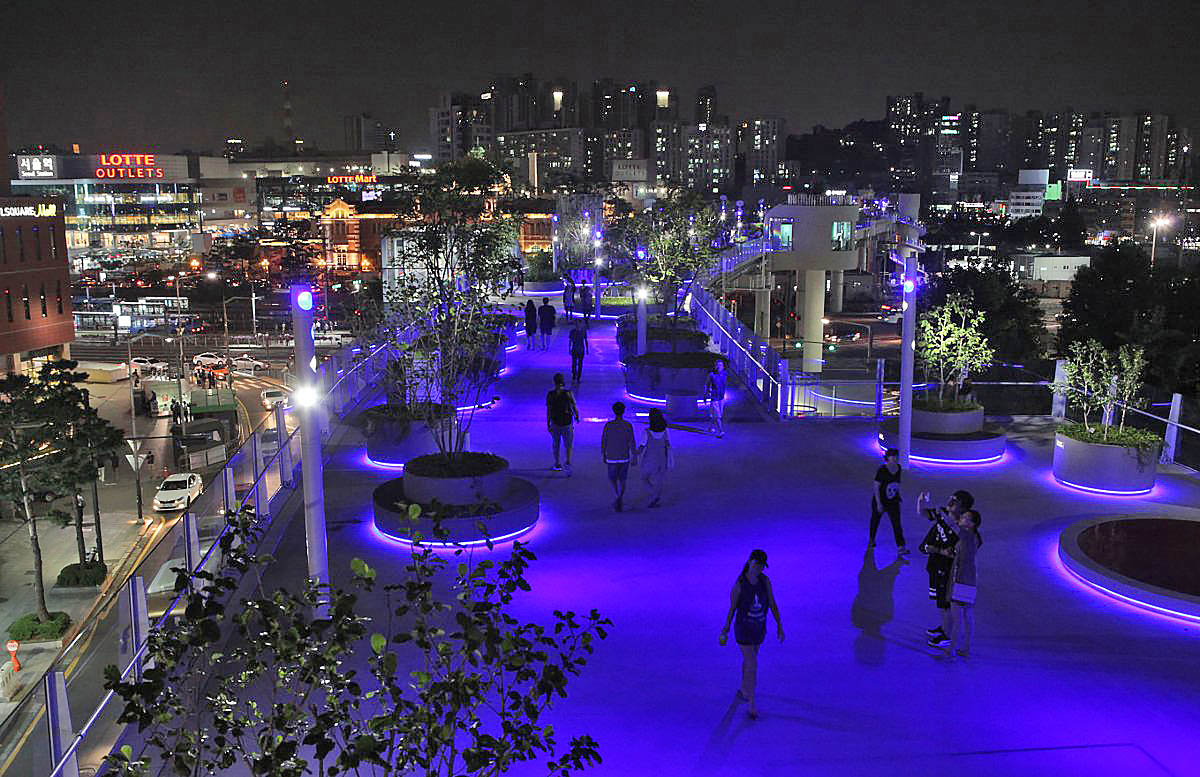The Seoul Metropolitan Government will build seven new pedestrian paths from Seoullo 7017 branching out into neighboring urban regeneration areas, including Seogye-dong, Jungnim-dong, Hoehyeon-dong, Huam-dong, and Seosomun-dong.
Seoullo 7017, in its initial phase, was designed to convert an old highway overpass into a walkway in order to connect the eastern and western areas of Seoul Station. This second phase of the project is meant to promote the positive effects of urban regeneration and the vitality of local economies toward neighborhoods.
The project essentially seeks to connect severed roads with greenery while incorporating diversified business models, taking into account the varied conditional and environmental factors. Some activities include the remodeling to better connect buildings, creating greener alleyways, increasing the number of backstreet cafés, and extending walkways.
Descriptions of the seven new walkways comprised of Jungnim 1-gil, Jungnim 2-gil, Seogye 1-gil, Seogye-2 gil, Huam 1-gil, Huam 2-gil, and Hoehyeon 1&2-gil, are provided below:
Jungnim 1-gil (≈ 810m): From Yakhyeon Catholic Church to Chungjeongno Station, there are many antique houses and alleyways, demonstrating this area’s potential to become historically and culturally distinctive in the urban center of Seoul.
Jungnim 2-gil (≈ 790m): Passing through relatively large apartment buildings, this woodland path leads to Chungjeongno Station.
Seogye 1-gil (≈ 780m): Across narrow streets, vintage homes, and traditional Korean housing, the road leads from Malli Market to Hyochang Park. Along the way, you can catch a glimpse of the historical sewing culture in the Seoul station vicinity.
Seogye 2-gil (≈ 1,100m): Stretching from Cheongpa Children’s Park, the National Theater Company of Korea, and Cheongpa Hill, this area has a variety of historical and cultural uniqueness, featuring old sewing factories, beaten paths, Japanese-style housing, and more.
Huam 1-gil (≈ 1,300m): This walkway runs toward Yangdong Park and Huam Market behind Seoul Square, capturing the historical flow of time over the years.
Huam 2-gil (≈ 1,400m): From varied paths, inclusive of Seoullo and Sowol-ro City Wall, this road leads all the way to Namsan Mountain. The walkway is too steep to be suitable for walking, so it is in need of some road maintenance and improvement.
Hoehyeon 1&2-gil (≈ 1,400m): With plenty of modern and contemporary architectures, such as Hoehyeon Post Office, incorporated with colonial Japanese-style housing, visitors can take in the unique atmosphere fused together with the area’s resplendent history and culture.
The seven designated architects, in particular, will respectively orchestrate each of the seven walkways to be built, an unprecedented move in the city of Seoul. Every vital resource, including alleyways, buildings, landmarks, and public open spaces, will be taken into account as the seven architects establish a general master plan for entire project. They are also responsible for long-term sustainable preservation through constant communication and mutual consultation together with local residents, public institutions, and pertinent filed specialists.
Source: Seoul Metropolitan Government
